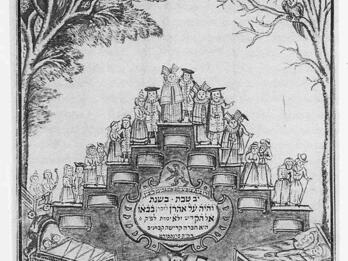The World Upside Down
Here is a song that I created,
well composed and uncomplicated;
you can call it a song or call it a dirge.
I’d like to tell you some of my troubles:
some men have problems by the ounce or the dram,
but I, poor wretch, have them by the hundredweight.
I don’t know what to do or who to tell them to,
or to whom I can recount my troubles in this world.
It was a dark day when I took up this work
—things were good before and I was comfortable,
never lacking bread in my basket—
but I said, “I’ll gain status and respect,
and shall be honored by the world.”
I know now that this was a great mistake:
this work is all frustration and restraint,
and the future I’d pictured was a fantasy.
I shall suffer more and shall not gain,
and shall be scorned by all the world.
Before, I made everybody around me happy;
now, nobody mentions my name unless it is to criticize me.
How could I not cry?
How could I not sing a mournful song
and complain about the world?
Before, I was loved by old and young alike,
the mere sight of my face made them happy;
now, when they see me, they turn their heads to face the other way.
How am I to take this?
How am I expected to bear the evil in this world?
I am despised by the rich and the poor,
my longtime friends act like they don’t know me,
all my plans have been thwarted.
Where shall I go?
Can I find a path where I shall not lose my way in the world?
Whenever I encounter a rich man, I am greatly troubled
for he expects me to do what I am told,
regardless of whether it is ethical or not.
How am I to handle this situation? Who should I listen to?
Who should I try to please in this world?
The poor man is focused on survival,
and asks for nothing but to do what he must,
wanting no one to judge if it is crooked or just.
But if I do not question it, I shall lose my soul
and shall be punished in the next world.
By speaking ill of me, they use their lantern
to burn the candle of one who hasn’t a candle to his name.
It is enough to keep a weary man up at night.
Say what you like, I shall speak; say what you like, I shall talk;
but I cannot still the chatter of the world.
They sit down to talk in vain;
One says to the other, “What can I tell you, brother?
He has it easy, this writer.”
And when I hear this, how it will pain me!
My heart will be broken by the chatter of the world.
The other replies, “I won’t say a word.
But he sits at home and still gets paid,
Makes his living without a stroke of work.
If I had the guts, I would have revenge on him
And bring him down in the eyes of the world.”
1
A cruel word stings like a splinter;
they do not see my expenses, how much things cost
or the impact of the occasional illness.
How shall I get by? What shall I live on
and how shall I steer my way through this world?
And the worst part of all: I cannot say a word,
either out of shame or out of fear;
instead of replying, I remain silent;
if I did reply, I would be in danger,
and would obtain nothing from the people of the world.
God in heaven, find me some other pursuit
even if it is other poorly paid work,
for I am not one to covet possessions;
perhaps I shall take time off and serve God
and shall gain something for the next world.
He is powerful, merciful, and faithful,
and I have always put my trust in Him;
may He give me my home in Erets Yisra’el:
there I shall die, there I shall be buried,
and go directly to the next world.




